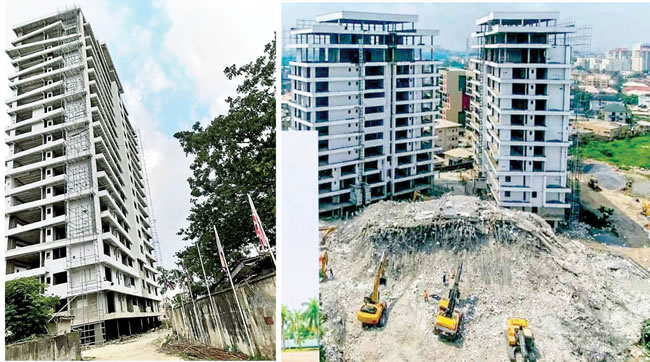How To Prevent Building Collapse Through Technology — Experts
[ad_1]
Built environment experts are canvassing the adoption of technology to prevent incessant building collapses in the country. DAYO AYEYEMI reports.
Worried about the incessant building collapses in the country, experts in the built environment industry are making a case for the use of technology to halt the trend.
According to them, such technology will reveal what is happening in the building from the foundation.
Explaining how it works, the managing director of Lordsfield Limited, Mr Ropo Olajugba, a surveyor, said technology could be installed in the building to measure its stability against structural failure.
According to him, the technology, which is known as a censor, could be used to measure whether the building is tilting or bending.
To Olajugba, it is high time professionals and home builders moved up and used technology to stop buildings from collapsing.
He said: “A censor measures what is called tilt. As the building is tilting or bending, it will get to a point where it will give way. So you put a censor on that building.
“We need to move up and use technology to stop buildings from collapsing. When you put a censor on a building, I can stay in another house and measure what is happening. I can set an alarm at a point where the structure is shifting before it becomes a disaster where people will die.
“In developed countries, once you put a censor, it measures what is happening on the building from the foundation up. Before it happens, it will be easy to evacuate people,” he said.
Another cause of building collapse, he said, was the inability of some developers to situate piles in the correct locations in sand-filled areas.
Most of the time, according to him, nobody is ready for the land to settle, hence the wrong distribution of piles.
“Another thing is that when you are building in sand-filled areas such as Ikoyi, Victoria Island, Lekki, and Ajah areas of Lagos State, nobody is ready for the land to settle before pilling.
“If you are going to put 10 piles on the building and you fail to put them in the correct locations, of course, the building is going to collapse.
“You are supposed to put 10 piles but you put them in the wrong places. You are supposed to distribute it equally, and the moment you don’t distribute it equally, either because you are in a hurry or because you want to cut costs, that building will begin to sink. It will collapse later,” he said.
He advised professionals to avoid compromise, explaining that the time has come to embrace technology to nip building collapse in the bud.
Meanwhile, an engineering firm says it’s unveiling software to eliminate building collapse /failures in the country.
According to the firm, the software is a type of concrete testing designed to allow users to plan, collate, and analyze concrete test results efficiently.
“It, however, allows seamless and convenient data access to concrete from mix design to field concrete works,” the management of the firm said, in a press statement.
Chairman of the Nigerian Institution of Surveyors, Lagos Body of Fellows,
Prince Afolabi Solesi canvassed the enforcement of standards while enjoining supervising ministries or agencies of government to do their work.
He described surveying as the “bedrock of all the meaningful development,” saying that compromise on standards was responsible for incessant building collapse.
“Building collapse is a very serious matter now, and a lot of factors can contribute to building collapse. For example, if the professional says these are the things to do and the people should ensure compliance, if they don’t do the work properly, there will be problems.
“Sometimes when an engineer recommends certain works are done following the architect’s design and you try to cut corners, you are taking a lot of risks that can end up in the collapse of the building, claiming lives and valuables,” Solesi said.
In the sector, he said, a lot of compromises exist in the industry, hence the incessant building collapse.
To stop the compromise of professionals or building owners, Solesi said that enforcement is key.
“If you bring quacks because you don’t want to pay professionals, you are creating a problem that may not even surface in the immediate but later,” he said
The solution, according to him, is that people should engage professionals, adding that there must be constant enforcement of standards.
Besides, he called on the supervising ministry/ agencies to do their work.
Many factors adduced as reasons for incessant building collapse in Nigeria include the engagement of quacks/non-involvement of professionals, poor procurement processes, the use of substandard building materials, a lack of supervision, shoddy work, faulty foundations, poor mix, and a lack of soil testing, among others.
Latest data
The latest data from the Building Collapse Prevention Guild ( BCPG), has shown that no fewer than two cases of building collapse occurred between January and November 1, 2022.
This is exactly one year after the 21-storey building on 42 Gerrard Road, Ikoyi, Lagos, collapsed like a pack of cards, killing 45 people while leaving 15 survivors in critical pain.
The data by BCPG show that between 2022 and 2011, 129 buildings collapsed in Lagos State.
These are the figures: 20 incidents recorded in 2022; 13 in 2021; 20 in 2020; 17 in 2019; 1 in 2018; 4 in 2017; 2 in 2016; 10 in 2015; 7 in 2014; 16 in 2013; 5 in 2012 and 14 cases in 2011, respectively.
[ad_2]
Tribune















Post Comment